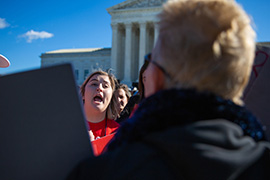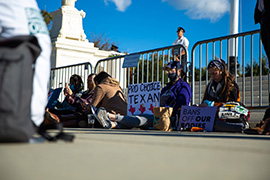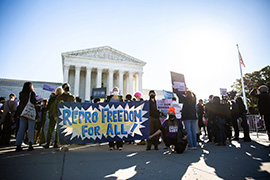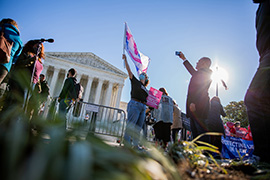- Slug: BC-CNS-Scotus Abortion,820
- 6 photos, video story available (thumbnails, captions below)
By Genesis Sandoval
Cronkite News
WASHINGTON – The future of abortion rights was not strictly the issue before the Supreme Court when it took up Texas’ strict abortion law Monday, but that was not evident from the scores of protesters who gathered outside the court.
Both sides gathered for a largely peaceful rally, where most of the action was a protest version of whack-a-mole, with each side jockeying to get its signs and its message in front of the other.
“As a Texan, as someone who’s had all their abortions in Texas, I think it’s really important that they hear from people who had abortions,” said Kenya Martin, an abortion storyteller with We Testify, which is dedicated to ending the stigma surrounding abortion.
But Brooke Paz said the voices that need to be heard are those of “the pre-born.”
“We’re here outside the Supreme Court to give a voice to the voiceless, the pre-born, who don’t get a choice on whether they live or die,” said Paz, government affairs coordinator for Students For Life Action.
Students For Life Action was a sea of red outside the court, with members in red T-shirts bearing red signs and heart-shaped balloons for the rally. They were just one of many protesters wielding signs ranging from “Liberal Atheist Against Abortion” to “Catholics for Choice.”
Despite the emotional issue, the protesters were mostly low-key, with both sides settling down to listen as arguments were piped over loudspeakers on the court plaza.
Inside the court, the justices were hearing two challenges to Senate Bill 8, the Texas law that effectively bans abortions after a fetal heartbeat is detected, usually at about six weeks.
On its face, that would appear to violate previous Supreme Court rulings that bar states from placing undue burdens on a woman’s right to get an abortion before fetal viability, typically considered at least 24 weeks.
But critics have been unable to block the Texas law, which took effect Sept. 1, because it entrusts enforcement to private citizens, not state officials. That has made it impossible for opponents to sue the state and put the law on hold while they challenge it in courts.
Under SB 8, Texans who sue abortion providers or anyone who “aids or abets” somone getting an abortion after fetal “cardiac activity,” stand to get a minimum of $10,000 if their suit is successful. Critics have said the law amounts to making “bounty hunters” of state residents who can file suit repeatedly with no consequences.
U.S. Solicitor General Elizabeth Prelogar called SB 8 little more than an attempt by Texas to “act in direct defiance” of the court’s previous rulings on abortion, and warned that other rights would be targeted by other states if the law is allowed to stand.
That thread was picked up by several justices during arguments.
“So this is not limited to abortion,” said Justice Sonia Sotomayor, citing other possible targets like same-sex marriage or Second Amendment rights. “That’s the point that’s been raised. It’s limited to any law that a state thinks it’s dissatisfied with.”
Texas Solicitor General Judd Stone II argued that Congress could intervene if it felt that federal courts should be able to weigh in on what he said should be decided in state courts. But Justice Elena Kagan said that constitutional rights, like the privacy right to an abortion, should not face such hurdles.
“I mean, isn’t the point of a right that you don’t have to ask Congress?” Kagan asked. “Isn’t the point of a right that it doesn’t really matter what Congress thinks or what the majority of the American people think as to that right?”
While the case is pending, the law is in effect, which has led to a sharp drop in abortions in Texas. That’s what brought out Martin, who said “abortion is healthcare and it’s necessary.”
“As someone who worked in an abortion clinic in Texas, I think it’s important that I show up here today,” Martin said. “I feel like it’s my obligation to people like me who aren’t necessarily ready to be loud and proud and bold about abortion.”
The Texas law is just the first of two high-profile abortion cases the Supreme Court is scheduled to hear this term. On Dec. 1, it will hear a challenge to a Mississippi law that would make abortion illegal after 15 weeks, a direct challenge to the court’s previous rulings on abortion rights.
Activists on both sides are already looking to the future.
“Normally what happens in Texas kind of sets the tone, so I am concerned that what’s happening in Texas can trickle down to other places,” Martin said.
Paz hopes for the opposite.
“We are excited to see some other states that are going to get creative as well to protect their pre-born. We believe that abortion is harmful to both women and babies, we know that to be true, so we want what’s best for them,” Paz said.
For more stories from Cronkite News, visit cronkitenews.azpbs.org.
^__=
Web links:
_ SB 8: https://legiscan.com/TX/text/SB8/id/2395961
_ U.S. v. Texas arguments: https://www.supremecourt.gov/oral_arguments/argument_transcripts/2021/21-588_omjp.pdf
_ Whole Women’s Health v. Jackson arguments: https://www.supremecourt.gov/oral_arguments/argument_transcripts/2021/21-463_8758.pdf
_ Dobbs v. Jackson Women’s Health: https://www.scotusblog.com/case-files/cases/dobbs-v-jackson-womens-health-organization/
^__=
An anti-abortion protester makes her opinion known to an abortion-rights protester Monday outside the Supreme Court, where the justices took up SB 8, the restrictive Texas abortion law that effectively bans abortions after six weeks. Despite the emotional subject matter, the demonstrations were peaceful. (Photo by Diannie Chavez/Cronkite News)
While the Supreme Court heard arguments over SB 8, the restrictive Texas abortion law, demonstrators outside were mostly low-key and peaceful Monday morning, sitting and listening to arguments over loudspeakers after a round of protesting and counter-protesting. (Photo by Diannie Chavez/Cronkite News)
Critics say Texas’ strict new abortion law effectively prohibits abortions after six weeks, despite prior Supreme Court rulings that put the cut-off closer to 24 weeks. But the Texas law has been almost impossible to challenge because it entrusts enforcement to citizens and not state officials. (Photo by Diannie Chavez/Cronkite News)
The Texas abortion law is just the first of two abortion cases the Supreme Court is scheduled to take up this term that could weaken or reverse Roe v. Wade, the 1972 case that recognized a right to an abortion. On Dec. 1 the court will hear a Mississippi law banning abortions after 15 weeks. (Photo by Diannie Chavez/Cronkite News)
The abortion protests outside the Supreme Court Monday were mostly peaceful, with each side playing a protester’s version of whack-a-mole, jockeying to get their signs and their message in front of the other side’s, before settling down to listen to audio of the arguments going on inside the court. (Photo by Diannie Chavez/Cronkite News)
Anti-abortion protesters were among the several hundred from both sides of the abortion issue who gathered at the Supreme Court as it heard arguments on a strict new Texas law that bans abortions after a fetal heartbeat is detected, typically after about six weeks of gestation. (Photo by Diannie Chavez/Cronkite News)





